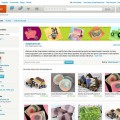 The eco-chic trend is the all rage these days. It’s about decadence and pampering while being friendly and gentle to our environment and bodies. The trend is taking off and so are the prices of many organic products.
The eco-chic trend is the all rage these days. It’s about decadence and pampering while being friendly and gentle to our environment and bodies. The trend is taking off and so are the prices of many organic products.
In the United States, the USDA has a certification program but it’s primarily there to address the needs of food and edible products, not beauty products. France has their Ecocert program and the UK has the Soil Association. The Soil Association will certify beauty products as organic and charge for this based on a sliding fee scale of revenue. Back in the U.S., the “big dogs” (like Whole Foods) are trying codify the standards for natural body and beauty products.Here are three new certification labels to watch for in the fight for dominance of this space in the beauty industry.
Whole Foods has a product line called Nude that launched in 2004 and is sealed with a Premium Body Care label. The label identifies over 250 ingredients that are unacceptable f or products including parabens, sodium lauryl sulfates and polyethylene glycols (check out the entire list here). To meet this label’s standards the product must pass the test by using the mildest of preservatives, the safest surfactants and premium standard fragrances oils.
or products including parabens, sodium lauryl sulfates and polyethylene glycols (check out the entire list here). To meet this label’s standards the product must pass the test by using the mildest of preservatives, the safest surfactants and premium standard fragrances oils.
OASIS (Organic And Sustainable Industry Standards) is a standard represented by companies such as Estee Lauder and L’Oreal. To seal your products with the OASIS label, the product must be 85 % certified organic (and soon to be 95 %, wowza!). Keep an eye out for the OASIS seal, it’s said to be coming out sometime this year.
 The IOS cosmetic standards one of North America’s first system certification standard for organic and natural cosmetics. To meet this label’s standard the product must be 95% of natural origin and include recyclable packaging. It also must be manufactured with out producing any toxins.
The IOS cosmetic standards one of North America’s first system certification standard for organic and natural cosmetics. To meet this label’s standard the product must be 95% of natural origin and include recyclable packaging. It also must be manufactured with out producing any toxins.
What does this mean for the little guys? It means that potential customers will become more educated about the terms “natural” and “organic” and ask you more clarifying questions prior to purchasing. If you want to stay in the running for these categories, you’ll need to be extra careful about the ingredients that go into your products.One of my concerns around all of this codifying and competing “seals of approval” is the cost to keep up. I have a sneaking suspicion that these changes might push out the little guys (certification can be expensive), leaving total domination of the natural and organic body care industry to those that can afford it (i.e. well established, larger brands).





Ken,
I agree! Building relationships with customers is very important. Trust goes a long way to helping with both brand loyalty and also the permission to educate.
i am in process of getting my products approved for premium standards for whole foods natural market. my products are already appropriate, i have been approved to sell there, i just have to change the labeling.
As someone relatively new to making soaps and body products, I find this topic rather frightening. I think about what I have already invested and what I have planned to do. I am a very VERY little guy. I appreciate your addressing this topic, Anne-Marie, and I will be anxiously awaiting your next comments, as well as those of other bloggers.
A-M…. The last thing we need is more regulation. I would rather not have the government decide what is natural or organic. It isn’t going to make the consumer any safer. I welcome questions about my products from informed consumers. Education is key and I agree with you that it should be done in a positive way. A smart customer hopefully will not be fooled by the word “natural” on a product or take an organic certification on face value alone. It’s great marketing though, and even better if it’s true. Perhaps consumers will think for themselves and make an informed decision. We can also do ourselves a favor and build a trusting relationship with our customers. Offer a quality product, treat people right and educate them. Let them feel that the know us. This is something that you do very well. I don’t want to count the little guys out yet…especially since I am about to become one of them. Thanks for keeping us informed and for your work involving the “Globalization Act”.
Ken A. (AKA anonymous)
P.S. no charge for the future blog idea…
Hi Anon –
That’s a great question – and one that sparks a good amount of debate on many soap boards and soapmaking list.
Since there are not currently any regulations around the use of those two words, most anything “goes” under those terms.
And, one person’s idea of natural is another person’s idea of synthetic.
I feel strongly about informing consumers in a positive way – not in a fear mongering sort of way.
Having a web site is a wonderful way to get your message across since you’re not paying for the printing costs.
This is a great idea for a future blog post. Thanks for sparking my interest. =)
I may be wrong but….I was always a label reader and most “natural” and “organic” products seem to be filled with synthetic petroleum byproducts and ethoxylated vegetable compunds. From what I have read many organic certifications are a bit misleading. We need to do our homework and continue to inform our customers about these issues in regard to our products.Anne-Marie…any ideas on how we can do this effectively?
A-M,
Did you know Bert’s Bees was in on it, too? Before they were bought out by Colgate?
Interesting, no?
Amanda D.
Danincg Panda Soapworks
aka zeedancingpanda
Shelly,
Great question about preservatives! I’ll work on a post about that for publication in the next few days =)
~Thanks for keeping us “little guys” up to date…:)
Thanks for the interesting post, A-M.
I feel a lot like Dory from Nemo… “just keep soaping, just keep soaping!” Hopefully, with the knowledge that you share and a commitment to making great products, we can all stay afloat!
A-M,
Curious your thoughts about preservatives… am I correct to say that Brambleberry supports full-spectrum preservatives? According to the Whole Foods list, one wouldn’t be able to include those in their product offerings.
Shelley
Great post Anne-Marie. This is great information and plenty to think about.
Its frustrating to see the little guys suffer from a process that is meant to bring about good. It will be interesting to see how all of this plays out.
I have mixed feelings about this. I prefer to avoid many of the “harmful” ingredients on the list from Whole Foods – but things like alpha hydroxy acids and salicylic acid (which can easily come from natural origins) do have many benefits for the skin.